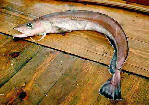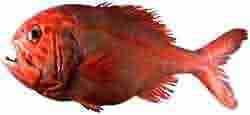|
EUROPEAN CETACEAN BYCATCH CAMPAIGN |
|
Europe to Regulate Deep Sea Fisheries |
|
LUXEMBOURG, June 12, 2002 (ENS) |
|
The European Commission has crafted a new Common Fisheries Policy for Europe in an attempt to revive collapsing fish populations and keep the European fishing industry alive at the same time. |
|
Fisheries Commissioner Franz Fischler presented the plan to the Fisheries Council in Luxembourg on Tuesday and was able to achieve political agreement on some key points. The Council, composed of EU Fisheries Ministers, recognized that too many boats competing for too few fish are placing an intolerable level of pressure on the fish in European waters. For the first time they agreed on regulatory measures for deep sea fish species which, according to scientific advice, are too heavily exploited and potentially outside safe biological limits. |
|
Fischler said, "I am convinced that it is more socially responsible to |
|
do everything that can be done to reduce fishing effort on stocks that |
|
are under threat, even if this inevitably means a smaller fleet, than |
|
doing nothing but just watch fishermen lose their jobs for lack of fish to catch." |
|
"Inertia is costing 8,000 EU fishermen their jobs every year," the commissioner said. "How many more jobs must we lose before we say 'enough is enough' and take the necessary measures to restore fish stocks to levels that will ensure the sustainability of our fisheries?" |
|
In Luxembourg on Tuesday, the Council reached a political agreement on a Commission proposal fixing the fishing opportunities for a number of deep sea fish species for 2002 and general political conclusions on the proposal regarding specific access requirements and associated conditions applicable to fishing for these species. |
|
As the two proposals are closely linked, they were discussed as a package and will be formally adopted together, once the European Parliament has given its opinion on the second proposal. |
|
Total allowable catch (TAC) limits have been agreed for black scabbardfish, blue ling cod, greater silver smelt, ling cod, orange roughy, red seabream, roundnose grenadier and tusk. Once the TAC regulation has been adopted, measures will be also put in place to limit fishing of a larger number of species. |
|
Vessels targeting deep water fish will have to hold a specific |
|
licence granted by EU Member States. |
|
The capacity of those vessels must not be greater than that of the vessels which in any one of the years 1998, 1999 or 2000 landed more than 10 metric tonnes of deep sea fish. |
|
It will be illegal for vessels which do not carry the special fishing permit for deep sea species to retain on board, land or transship more than a certain amount of those fish. |
|
In order to learn more about these species and their ecosystems, independent scientific observers will be placed on board vessels carrying licences to harvest deep sea fish according to a sampling plan to be submitted by Member States. |
|
Fishing activities will be monitored closely through the vessels' satellite monitoring system. Additional information will have to be recorded in the vessels' logbooks including details of fishing gear used and the time spent in the water. Catches of deep sea species will only be landed in designated ports. |
|
The management scheme for deep sea fish stocks will be reviewed and adapted as required on the basis of a report to be submitted by the Commission by June 2005. |
|
The compromise reached by the Council follows the main thrust of |
|
the Commission proposals but also takes into account new data |
|
regarding fishing for these species by Member States' fleets as well as the most recent scientific advice on these stocks issued by the International Council for the Exploration of the Sea last week. |
|
It also opens the way for the extension of the scope of conservation measures fixing fishing possibilities for these species to cover other species which are not included in the present TAC regulation, such as deep sea sharks. This initiative also opens the ground for a future multilateral management of these stocks. |
|
"The results of the Council send a clear signal that the EU is serious about establishing conservation measures to ensure sustainable fisheries, especially for vulnerable species such as deep water fish. With these measures the EU is taking the lead in the effort to regulate deep sea fisheries also in international waters," Commissioner Fischler said. |
|
WWF activists dressed as fish presented the European Fisheries Ministers with a letter calling on governments not to block reform of what they said is "Europe's failed Common Fisheries Policy." The letter, addressed particularly to the Fisheries Ministers of Spain, France and Portugal, was signed by thousands of WWF supporters. |
|
"The truth is that fish stocks are severely depleted and cannot sustain Europe's fishing fleet at its current size," said WWF European Fisheries campaign director, Karl Wagner. "Tough decisions have got to be made - and that is what some politicians find so unacceptable. Decisions with serious implications for employment in fishing communities are not easy. There is a case for more measures to help the coastal areas most affected by restructuring." |
|
The very future of European fisheries depends on its success of the forthcoming reform of the Common Fisheries Policy, Commissioner Fischler says. He blamed short sighted measures, inadequate monitoring of fishing activities, wide differences in penalties, public aid which has often encouraged fleet overcapacity instead of eliminating it, and insufficient involvement of stakeholders for the collapse of fish populations. |
|
On June 17, the commissioner is hosting the first Internet chat dedicated to the new Common Fisheries Policy. The chat will take place after the European Commission will have presented its proposals for the reform of the Common Fisheries Policy. |
|
The chat will be live from 18.00 to 20.00 CET in all11 EU official languages. |
|
|
|
|


